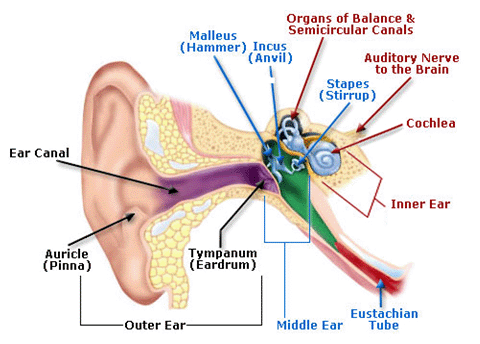Dizziness is a term used to describe the sense of feeling faint or unsteady. If you experience an augmented whirling sensation that makes it seem like your surroundings are spinning, that perception is called vertigo.
Both concepts are connected: dizziness refers to anything that makes a person feel like their head is spinning, while vertigo is a specific kind of dizziness related to a medical condition. In a nutshell, dizziness is a broad but loose term that includes vertigo (spinning), disequilibrium (imbalance), and lightheadedness (presyncope). Additionally, vertigo can cause a person to nauseate and vomit profusely, which is indicative of a severe form of dizziness.
Mechanism of Dizziness
We can further explore dizziness to comprehend the prospect. As mentioned before, dizziness can mean any likelihood, such as lightheadedness, imbalance, or motion sickness. Regardless of what causes the sensation, all of the perceptions, as mentioned earlier, are linked to balance or lack thereof.
An intricate interaction between multiple factors of the nervous system in the body upholds a person’s sense of equilibrium. These factors are listed below:
- The inner ear, also known as the labyrinth, manages the directions of motion like forward, backward, side to side, and up and down
- The eyes also facilitate the directions of motion and track the body relative to space, i.e., right side or left side
- The joints, or more specifically, the pressure receptors located in the spinal cord, enable the body to realize which part of the body is in contact with the ground.
- The proprioception or muscle sensory receptors inform which body part is immobile.
- The central nervous system, which includes the brain and spine, processes the information and uses it to support balance.
In the event that the systems involved in this process give conflicting messages to the brain and spinal cord, the reaction is dizziness.
What Causes Dizziness
One of several sources of dizziness is when the brain fails to get sufficient blood flow. The consequence of this malfunction is an impression of lightheadedness. For example, some people are likely to experience this feeling if they are taking certain medications that have this side effect. The simple act of getting up quickly after lying down can incite this feeling.
A chronic deficiency in blood circulation can also cause dizziness. Arteriosclerosis, or inflammation of the arteries, is a frequent trait in patients suffering from ailments such as diabetes, cholesterol, and high blood pressure.
In addition to defects in bodily functions, external determinants can also instigate dizziness. For instance, nicotine from tobacco or caffeine derived from coffee consumption are stimulants that can contract blood flow. Likewise, feelings of stress and trauma are also responsible for causing dizziness.
Neurological diseases are afflictions that affect the nerves connected to a person’s faculty of balance. Archetypes include multiple sclerosis and syphilis. Although it is less likely that such conditions can result in dizziness, it is known to happen in patients. Apprehension is yet another reason for dizziness. Hyperventilation is also linked to the feeling. If a person does not breathe properly for long periods, dizziness is a potential outcome.
Reasons for Vertigo
One version of vertigo is Benign Paroxysmal Positional Vertigo (BPPV), a condition in which there is a dramatic change in head position, such as looking up immediately. It lasts less than a minute and stops once the person is still. BPPV involves a displaced otolith entering the balance canals. It can typically last days or even weeks, depending on the particular case.
Meniere’s disease, one of the most common vertigo disorders, is another predicament that encourages attacks of vertigo in individuals. However, patients suffering from this disease may experience enduring attacks, which can last hours at a stretch as well. Other symptoms include nausea and vomiting. Some patients acquire this illness after flying, as the change in air pressure severely affects them.
Yet another cause of vertigo is a migraine. In its simplest form, a migraine is a headache. However, patients who experience the plight of a migraine have excessive headaches sporadically. They range from mild to severe and can cause extraordinary discomfort when the severity increases. Augmented sensitivity brings about vertigo.

Public Domain via Wikimedia Commons
Infections are also a proponent of this disease, particularly those aimed at the inner ear. The ear’s nerve is connected directly to the brain, which are attacked by viruses. As a consequence, patients may have vertigo for days. Infections must be treated promptly since certain ailments like mastoiditis can actually obliterate a person’s ability to hear. Also, the ears play a critical role in promoting balance, which will also be eliminated under these circumstances.
An injury can also introduce vertigo to the equation, specifically those suffering from head wounds. A concussion or fractures are two cases where patients may suffer from debilitating vertigo. It is likely to be incapacitating and paralyzing for the patient. BBPV generally transpires in the aftermath of an injury. Moreover, allergies can also result in vertigo. If a person is allergic to pollen, it may incite an episode of vertigo.
Treatments
You should always get diagnosed by your physician first, but, in general, patients suffering from a bout of dizziness or vertigo can take different routes. The most common method is to medication. For instance, if a patient has Meniere’s disease, then specialists may prescribe medicines like water pills (diuretic).
Antihistamines such as meclizine (Antivert) and anticholinergics can also curtail dizziness. Furthermore, pharmaceutical companies develop medications for nausea and anxiety. Examples include diazepam (Valium), which is the go-to medicine when it comes to treating apprehension.
Other ways to alleviate dizziness and vertigo involve therapeutic measures. Head position maneuvers like the canalith technique can assuage victims of BPPV. The head is carefully positioned in order to make the patients comfortable. It is known to provide fast relief to patients.
Balance and psychotherapy are other means if patients use therapy as opposed to medication. The former involves learning exercises that improve your balance and gradually make you less susceptible to lapses in balance. It is also called vestibular rehabilitation. Also, the latter can be particularly useful for people who get anxiety attacks.
Regardless of the method(s) you use, consult with your doctor or medical professional before taking any medications. A doctor or certified practitioner are the only ones who can prescribe the appropriate medication for you!

